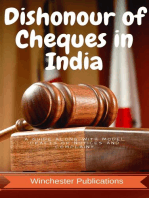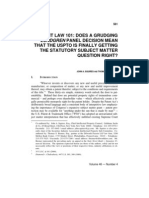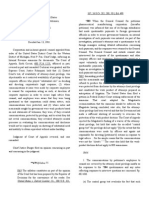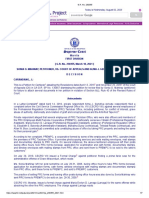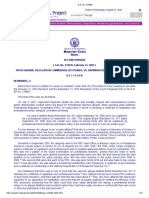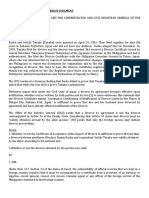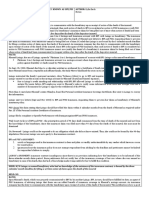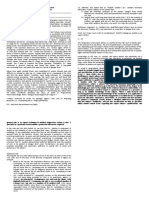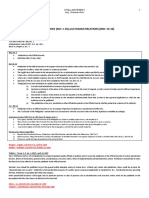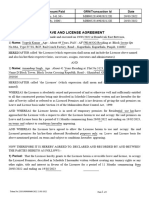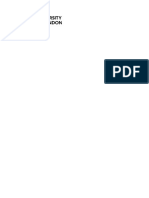010 State Street Bank Vs Signature Financial
010 State Street Bank Vs Signature Financial
Uploaded by
Kylie Kaur Manalon DadoCopyright:
Available Formats
010 State Street Bank Vs Signature Financial
010 State Street Bank Vs Signature Financial
Uploaded by
Kylie Kaur Manalon DadoOriginal Description:
Original Title
Copyright
Available Formats
Share this document
Did you find this document useful?
Is this content inappropriate?
Copyright:
Available Formats
010 State Street Bank Vs Signature Financial
010 State Street Bank Vs Signature Financial
Uploaded by
Kylie Kaur Manalon DadoCopyright:
Available Formats
State Street Bank & Trust Co. vs Signature Financial Group Inc.
US Court of Appeals Federal Circuit
July 23, 1998
149 F.3d 1368
Facts:
Respondent Signature is the assignee of the 056 patent which is entitled Data
Processing System for Hub and Spoke Financial Services Configuration which
was issued on 9 March 1993, R. Todd Boes as the inventor.
The '056 patent is generally directed to a data processing system (the system) for
implementing an investment structure which was developed for use in Signature's
business as an administrator and accounting agent for mutual funds. The system,
identified by the proprietary name Hub and Spoke TM, facilitates a structure whereby
mutual funds (Spokes) pool their assets in an investment portfolio (Hub)
organized as a partnership.
The invention relates to a system that allows an administrator to monitor and record the
financial information flow and makes all calculations necessary for maintaining a partner
fund financial services configuration.
State Street and Signature are both in the business of acting as custodians and
accounting agents for multi-tiered partnership fund financial services. State Street
negotiated with Signature for a license to use its patented data processing system
described and claimed in the '056 patent.
State Street brought a declaratory judgment action asserting invalidity,
unenforceability, and non-infringement in Massachusetts district court, and then
filed a motion for partial summary judgment of patent invalidity for failure to claim
statutory subject matter under Section 101. Motion was granted, hence, appeal.
Section 101. Whoever invents or discovers any new and useful process, machine,
manufacture, or composition of matter, or any new and useful improvement thereof, may
obtain a patent therefor, subject to the conditions and requirements of this title.
Issue:
WON 056 patent is invalid for failure to claim statutory subject matter under Section 101
Decision:
We hold that declaratory judgment plaintiff State Street was not entitled to the
grant of summary judgment of invalidity of the '056 patent under Sec. 101 as a
matter of law, because the patent claims are directed to statutory subject matter.
The plain and unambiguous meaning of Section 101 is that any invention falling within
one of the 4 stated categories (process, machine, manufacture, or composition of
matter) of statutory subject matter may be patented.
Mathematical Algorithms Exception:
The SC has identified three categories of subject matter that are unpatentable, namely
"laws of nature, natural phenomena, and abstract ideas." Of particular relevance to this
case, the Court has held that mathematical algorithms are not patentable subject
matter to the extent that they are merely abstract ideas.
Unpatentable mathematical algorithms are identifiable by showing they are merely
abstract ideas constituting disembodied concepts or truths that are not "useful." From a
practical standpoint, this means that to be patentable an algorithm must be applied in
a "useful" way.
We hold that the transformation of data, representing discrete dollar amounts, by
a machine through a series of mathematical calculations into a final share price,
constitutes a practical application of a mathematical algorithm, formula, or
calculation, because it produces "a useful, concrete and tangible result"--a final share
price momentarily fixed for recording and reporting purposes and even accepted and
relied upon by regulatory authorities and in subsequent trades.
The question of whether a claim encompasses statutory subject matter should not focus
on which of the 4 categories of subject matter a claim is directed to--process, machine,
manufacture, or composition of matter--but rather on the essential characteristics of the
subject matter, in particular, its practical utility.
Sec. 101 specifies that statutory subject matter must also satisfy the other "conditions
and requirements" of Title 35, including novelty, nonobviousness, and adequacy of
disclosure and notice. Claim 1 is directed to a machine programmed with the Hub
and Spoke software and admittedly produces a "useful, concrete, and tangible
result." This renders it statutory subject matter, even if the useful result is expressed in
numbers, such as price, profit, percentage, cost, or loss.
Business Method Exception:
As an alternative ground for invalidating the '056 patent under Sec. 101, the court relied
on the judicially-created, so-called "business method" exception to statutory subject
matter. Business methods should be subject to the same legal requirements for
patentability as applied to any other process or method.
This case is no exception. The primary reason for finding the patent invalid under the
business method exception as follows:
If Signature's invention was patentable, any financial institution desirous of implementing
a multi-tiered funding complex modeled on a Hub and Spoke configuration would be
required to seek Signature's permission. This is so because the '056 Patent is claimed
sufficiently broadly to foreclose virtually any computer-implemented accounting method
necessary to manage this type of financial structure.
Though seemingly within the category of process or method, a method of doing
business can be rejected as not being within the statutory classes. Claims should
not be categorized as methods of doing business. Instead such claims should be treated
like any other process claims.
Appealed Decision REVERSED; Case REMANDED to the district court for further
proceedings consistent with this opinion.
You might also like
- Defence - RedactedDocument15 pagesDefence - RedactedAdam Ha100% (1)
- Protecting The Idea and Other Legal Issues For The EntrepreneurDocument27 pagesProtecting The Idea and Other Legal Issues For The Entrepreneurfaqirbihi100% (1)
- Dishonour of Cheques in India: A Guide along with Model Drafts of Notices and ComplaintFrom EverandDishonour of Cheques in India: A Guide along with Model Drafts of Notices and ComplaintRating: 4 out of 5 stars4/5 (1)
- Restatement of Property:MortgagesDocument771 pagesRestatement of Property:Mortgagesmason rush50% (2)
- State Street Bank Trust Co vs. Signature Financial GroupDocument2 pagesState Street Bank Trust Co vs. Signature Financial GroupIñigo Mathay RojasNo ratings yet
- State Street Bank & Trust Co. v. Signature Financial Group, Inc., 149 F.3d 1368, 47 U.S.P.Q.2d 1596 (Fed. Cir. 1998) (Re: Business Method Exception)Document2 pagesState Street Bank & Trust Co. v. Signature Financial Group, Inc., 149 F.3d 1368, 47 U.S.P.Q.2d 1596 (Fed. Cir. 1998) (Re: Business Method Exception)Eugene LabellaNo ratings yet
- 007 State Street Bank & Trust Co. V. Signature Financial Group (San Pedro)Document2 pages007 State Street Bank & Trust Co. V. Signature Financial Group (San Pedro)Ic San PedroNo ratings yet
- State Street Bank and Trust CompanyDocument2 pagesState Street Bank and Trust Companypeterpark0903No ratings yet
- Smith & Nephew CommentsDocument5 pagesSmith & Nephew CommentsJennifer M GallagherNo ratings yet
- HTTPS://WWW Scribd com/book/282545608/Intermediate-Financial-TheoryDocument16 pagesHTTPS://WWW Scribd com/book/282545608/Intermediate-Financial-TheoryermaflNo ratings yet
- Thomas O. Jones v. Management and Computer Services, Inc., Pentamation Enterprises, Inc., Jeffrey P. Feather, Joseph Sullivan, David Bloys and Charles Wistar, 976 F.2d 857, 3rd Cir. (1992)Document7 pagesThomas O. Jones v. Management and Computer Services, Inc., Pentamation Enterprises, Inc., Jeffrey P. Feather, Joseph Sullivan, David Bloys and Charles Wistar, 976 F.2d 857, 3rd Cir. (1992)Scribd Government DocsNo ratings yet
- MPA CommentsDocument12 pagesMPA CommentsJennifer M GallagherNo ratings yet
- CFR - PatentLaw101Document26 pagesCFR - PatentLaw101Mrkva2000 account!No ratings yet
- CPA TestDocument22 pagesCPA Testdani13_335942No ratings yet
- Leading Asset Manager Uses AutoRek To Improve AML Transaction Monitoring ProcessesDocument5 pagesLeading Asset Manager Uses AutoRek To Improve AML Transaction Monitoring ProcessesrockonsmileNo ratings yet
- Response To Supreme Court Feedback Letter On 138 NI ActDocument4 pagesResponse To Supreme Court Feedback Letter On 138 NI ActlekdenbasiNo ratings yet
- Judicial UpdateDocument10 pagesJudicial UpdateRajbir SinghNo ratings yet
- CCIA CommentsDocument22 pagesCCIA CommentsJennifer M GallagherNo ratings yet
- White House Patent Fact SheetDocument5 pagesWhite House Patent Fact SheetAlex FitzpatrickNo ratings yet
- Private parking charge - abuse of process defence v1Document8 pagesPrivate parking charge - abuse of process defence v1Anthony RobertsNo ratings yet
- Alice Corp. v. CLS Bank Int’l _ 573 U.S. 208 (2014)Document10 pagesAlice Corp. v. CLS Bank Int’l _ 573 U.S. 208 (2014)ryan.boreloNo ratings yet
- CIT vs Mis Bharti Teletech Ltd - Delhi High CourtDocument9 pagesCIT vs Mis Bharti Teletech Ltd - Delhi High CourtSubramanyam SettyNo ratings yet
- 144 Caparros Art 6 Sec 1Document1 page144 Caparros Art 6 Sec 1KathleneGabrielAzasHaoNo ratings yet
- Thesis Property Plant and EquipmentDocument5 pagesThesis Property Plant and Equipmentbk32j4wn100% (2)
- Compedium (Team Q)Document6 pagesCompedium (Team Q)Nandini SrivastavaNo ratings yet
- Commercial Court Bill ConceptsDocument4 pagesCommercial Court Bill ConceptsTarun SethiNo ratings yet
- One-Write Plus: Help Your Small Business Clients Help YouDocument3 pagesOne-Write Plus: Help Your Small Business Clients Help YouParineeta SharmaNo ratings yet
- Landmark Technology v. Bridgestone AmericasDocument18 pagesLandmark Technology v. Bridgestone AmericasPriorSmartNo ratings yet
- 02.11.2024-IndiaCorp Law-NCLT Shift A Deeper Dive Into Merger Schemes and Public InterestDocument4 pages02.11.2024-IndiaCorp Law-NCLT Shift A Deeper Dive Into Merger Schemes and Public InterestheemurawatNo ratings yet
- Audit Planning and Analytical Procedures: Review Questions 8-1Document40 pagesAudit Planning and Analytical Procedures: Review Questions 8-1Gordon FooNo ratings yet
- Stop Endless Second-Guessing: Inventors Need To Know The Government Will Protect ThemDocument2 pagesStop Endless Second-Guessing: Inventors Need To Know The Government Will Protect ThemRachmad Hakim S.No ratings yet
- The Patent Paradox - New Insights Through Decision Support Using Compound OptionsDocument6 pagesThe Patent Paradox - New Insights Through Decision Support Using Compound OptionsRobson GuedesNo ratings yet
- Analysis of Republict Act No. 8293Document14 pagesAnalysis of Republict Act No. 8293John Larrence Carpio OrigenesNo ratings yet
- ssrn-2911289Document22 pagesssrn-2911289鐘國晉No ratings yet
- ContentsDocument26 pagesContentsTlhadia KabubiNo ratings yet
- Judicial Processes I. Proper Implementation of Procedural LawsDocument5 pagesJudicial Processes I. Proper Implementation of Procedural LawslasandorNo ratings yet
- Freedom of Information1988Document3 pagesFreedom of Information1988Terry LollbackNo ratings yet
- Section Q: Extra Territorial Organisations and BodiesDocument3 pagesSection Q: Extra Territorial Organisations and BodiesLolitambika NeumannNo ratings yet
- Ankita MamDocument8 pagesAnkita Mamashish pandeyNo ratings yet
- Sctions 8, 30 and 36 of The Revised Securities Act Do Not Require The Enactment of Implementing Rules To Make Them Binding and EffectiveDocument2 pagesSctions 8, 30 and 36 of The Revised Securities Act Do Not Require The Enactment of Implementing Rules To Make Them Binding and Effectiveambet amboyNo ratings yet
- Ettienne Barnard Fees Costs Paper LSSADocument25 pagesEttienne Barnard Fees Costs Paper LSSAheindrichlouw40No ratings yet
- Upjohn V USDocument10 pagesUpjohn V USbbqsushi1987No ratings yet
- Globe Telecom Vs NTCDocument2 pagesGlobe Telecom Vs NTCJ. LapidNo ratings yet
- Bir Ruling No. Dac168 519-08Document12 pagesBir Ruling No. Dac168 519-08Jasreel DomasingNo ratings yet
- AAI CommentsDocument6 pagesAAI CommentsJennifer M GallagherNo ratings yet
- Roque, Jr. vs. Commission On Elections PDFDocument147 pagesRoque, Jr. vs. Commission On Elections PDFanon_614984256No ratings yet
- Reporter Pub. Co., Inc. v. Commissioner of Internal Revenue, 201 F.2d 743, 10th Cir. (1953)Document4 pagesReporter Pub. Co., Inc. v. Commissioner of Internal Revenue, 201 F.2d 743, 10th Cir. (1953)Scribd Government DocsNo ratings yet
- Obstacles and Barriers To The Derivative Action: Costs Orders Under Section 165 of The Companies Act of 2008 (Part 2)Document20 pagesObstacles and Barriers To The Derivative Action: Costs Orders Under Section 165 of The Companies Act of 2008 (Part 2)reazNo ratings yet
- Law of Torts, MV Act and Consumer Protection: Eseries S.19Document11 pagesLaw of Torts, MV Act and Consumer Protection: Eseries S.19LAZY TWEETYNo ratings yet
- 1 Royalty StackingDocument6 pages1 Royalty StackingPrajwal KumarNo ratings yet
- Kas 15 - Intangible Assets Explanatory Note: Page 1 of 6Document6 pagesKas 15 - Intangible Assets Explanatory Note: Page 1 of 6r4inbowNo ratings yet
- CH 07Document15 pagesCH 07NishanthaNo ratings yet
- Principles of Taxation For Business and Investment Planning 17th Edition Jones Solutions Manual 1Document36 pagesPrinciples of Taxation For Business and Investment Planning 17th Edition Jones Solutions Manual 1shannonwaltersqwdifntckm100% (33)
- Principles of Taxation For Business and Investment Planning 17th Edition Jones Solutions Manual 1Document9 pagesPrinciples of Taxation For Business and Investment Planning 17th Edition Jones Solutions Manual 1linda100% (58)
- SSRN Id3960007Document3 pagesSSRN Id3960007Duyên NguyễnNo ratings yet
- Ramnath & Co: Interpretation of Beneficial ProvisionsDocument6 pagesRamnath & Co: Interpretation of Beneficial ProvisionsVaidehi KolheNo ratings yet
- .ArchFinancialAccountingTheoryandAnalysis TextandCases e11 صور 2Document30 pages.ArchFinancialAccountingTheoryandAnalysis TextandCases e11 صور 2mtarawneh941No ratings yet
- Wipo - Pub - 906-34-43 LecturaDocument10 pagesWipo - Pub - 906-34-43 LecturaAngie MariñoNo ratings yet
- Chapter One The Legal Perspective: Appropriate Profit Margins in Property & Casualty Insurance RatesDocument12 pagesChapter One The Legal Perspective: Appropriate Profit Margins in Property & Casualty Insurance RatesHuy Vu ChiNo ratings yet
- Smart Communications, Inc. vs. Aldecoa Chapter 8Document18 pagesSmart Communications, Inc. vs. Aldecoa Chapter 8Comchecs DmsfiNo ratings yet
- Protecting Your Company's Intellectual Property: A Practical Guide to Trademarks, Copyrights, Patents and Trade SecretsFrom EverandProtecting Your Company's Intellectual Property: A Practical Guide to Trademarks, Copyrights, Patents and Trade SecretsNo ratings yet
- Anti-Hazing Act of 2018: Special Penal LawsDocument3 pagesAnti-Hazing Act of 2018: Special Penal LawsKylie Kaur Manalon DadoNo ratings yet
- Financial Rehabilitation Rules of Procedure (2013) - Supra SourceDocument104 pagesFinancial Rehabilitation Rules of Procedure (2013) - Supra SourceKylie Kaur Manalon DadoNo ratings yet
- G.R. No. 230355Document7 pagesG.R. No. 230355Kylie Kaur Manalon DadoNo ratings yet
- G.R. No. L-48113Document4 pagesG.R. No. L-48113Kylie Kaur Manalon DadoNo ratings yet
- G.R. No. 214435Document12 pagesG.R. No. 214435Kylie Kaur Manalon DadoNo ratings yet
- Amco Republic of Resubmitted Decision: Indonesia: Case On JurisdictionDocument13 pagesAmco Republic of Resubmitted Decision: Indonesia: Case On JurisdictionKylie Kaur Manalon DadoNo ratings yet
- Tenaris V Venezuela PDFDocument206 pagesTenaris V Venezuela PDFKylie Kaur Manalon DadoNo ratings yet
- Civil Law Review Ii CONTRACTS - Atty. Crisostomo Uribe ProvisionsDocument10 pagesCivil Law Review Ii CONTRACTS - Atty. Crisostomo Uribe ProvisionsKylie Kaur Manalon Dado100% (1)
- The Corporation Code of The Philippines Title I General Provisions Definitions and ClassificationsDocument26 pagesThe Corporation Code of The Philippines Title I General Provisions Definitions and ClassificationsKylie Kaur Manalon DadoNo ratings yet
- Valid But Defective Void or Inexistent Rescissible Voidable Unenforceable Contracts: Contracts: ContractsDocument3 pagesValid But Defective Void or Inexistent Rescissible Voidable Unenforceable Contracts: Contracts: ContractsKylie Kaur Manalon DadoNo ratings yet
- Participation As Principal Arise. It StatesDocument36 pagesParticipation As Principal Arise. It StatesKylie Kaur Manalon DadoNo ratings yet
- RA 11053 - Anti Hazing Act of 2018 PDFDocument10 pagesRA 11053 - Anti Hazing Act of 2018 PDFKylie Kaur Manalon DadoNo ratings yet
- Highlights of The Republic Act No. 11053, Also Known As The Anti-Hazing Act of 2018Document2 pagesHighlights of The Republic Act No. 11053, Also Known As The Anti-Hazing Act of 2018Kylie Kaur Manalon Dado100% (1)
- Racho V TanakaDocument2 pagesRacho V TanakaKylie Kaur Manalon Dado67% (3)
- Void Donations, 739 (1), 736, 1409, FC 87Document2 pagesVoid Donations, 739 (1), 736, 1409, FC 87Kylie Kaur Manalon DadoNo ratings yet
- Yaung Chi OoDocument20 pagesYaung Chi OoKylie Kaur Manalon DadoNo ratings yet
- Republic V TionglicoDocument3 pagesRepublic V TionglicoKylie Kaur Manalon Dado100% (1)
- Pagkakaisa NG Mga Manggagawa Sa Triumph International vs. Ferrer-Calleja, G. R. No. 85915, Jan. 17, 1990Document9 pagesPagkakaisa NG Mga Manggagawa Sa Triumph International vs. Ferrer-Calleja, G. R. No. 85915, Jan. 17, 1990Kylie Kaur Manalon DadoNo ratings yet
- MethanexDocument307 pagesMethanexKylie Kaur Manalon DadoNo ratings yet
- Insular Bank V IAC (DADO)Document1 pageInsular Bank V IAC (DADO)Kylie Kaur Manalon DadoNo ratings yet
- 65 Bpi V LaingoDocument2 pages65 Bpi V LaingoKylie Kaur Manalon DadoNo ratings yet
- Al Warraq v. IndonesiaDocument216 pagesAl Warraq v. IndonesiaKylie Kaur Manalon Dado0% (1)
- 02 Casumpang V CortejoDocument2 pages02 Casumpang V CortejoKylie Kaur Manalon DadoNo ratings yet
- Lung Center vs. QCDocument2 pagesLung Center vs. QCKylie Kaur Manalon DadoNo ratings yet
- Tamargo Vs AwinganDocument2 pagesTamargo Vs AwinganKylie Kaur Manalon DadoNo ratings yet
- Civrev 1 PersonsDocument103 pagesCivrev 1 PersonsKylie Kaur Manalon DadoNo ratings yet
- Ulllted States Patent (10) Patent N0.: US 7,766,041 B2Document34 pagesUlllted States Patent (10) Patent N0.: US 7,766,041 B2scibduser001No ratings yet
- Leasehold Land TenureDocument6 pagesLeasehold Land Tenurejuniorronnie830705664741No ratings yet
- Agreement For Sale of Immovable PropertyDocument5 pagesAgreement For Sale of Immovable PropertySiddharth ShahNo ratings yet
- Padlocking of Leased PremisesDocument2 pagesPadlocking of Leased PremisesromarcambriNo ratings yet
- Land Title and Deeds - Part 2Document343 pagesLand Title and Deeds - Part 2Ber Sib JosNo ratings yet
- WILL - FormatDocument2 pagesWILL - FormatSukhrut MNo ratings yet
- Fierro v. Seguiran G.R. No. 152141Document3 pagesFierro v. Seguiran G.R. No. 152141rodel talabaNo ratings yet
- Volga D 604 AgreementDocument5 pagesVolga D 604 AgreementSaddam YusufNo ratings yet
- Contract of Lease Template PhilippinesDocument2 pagesContract of Lease Template PhilippinesJose Florinio FarconNo ratings yet
- de Santos v. IAC, GR L-69591, Jan. 25, 1988, 157 SCRA 295Document2 pagesde Santos v. IAC, GR L-69591, Jan. 25, 1988, 157 SCRA 295Gia DimayugaNo ratings yet
- Property Exam 2024 ADocument6 pagesProperty Exam 2024 Amubashirkakakhel7No ratings yet
- MODULE 3 Legal PrinciplesDocument11 pagesMODULE 3 Legal PrinciplesKristian Romeo NapiñasNo ratings yet
- ProEducate Practical Final ExaminationDocument16 pagesProEducate Practical Final ExaminationJerry ChooNo ratings yet
- Introduction To Estate Planning: Wills, Trusts & Estates Professor Catania Fall 2012Document35 pagesIntroduction To Estate Planning: Wills, Trusts & Estates Professor Catania Fall 2012Alex GarrigaNo ratings yet
- Rights of Owner of CopyrightDocument11 pagesRights of Owner of Copyrightshobhachauhan1823No ratings yet
- Rental - Lease AgreementDocument14 pagesRental - Lease Agreementace banawaNo ratings yet
- Islamic Law of Wills An Overview PDFDocument2 pagesIslamic Law of Wills An Overview PDFSHIVANINo ratings yet
- Thesis Intellectual Property RightsDocument7 pagesThesis Intellectual Property Rightsvaivuggld100% (2)
- Homestead & Free PatentsDocument17 pagesHomestead & Free PatentsJunCoyumaNo ratings yet
- Exception To Rule EquityDocument7 pagesException To Rule EquityHadhirah AzharNo ratings yet
- Real Security Created by Operation of The LawDocument10 pagesReal Security Created by Operation of The LawEl Sean YoungSet Nba IINo ratings yet
- Nebraska Residential Lease Agreement: Page 1 of 11Document11 pagesNebraska Residential Lease Agreement: Page 1 of 11Rachell HighfillNo ratings yet
- Chattel Mortgage AwakanDocument2 pagesChattel Mortgage Awakanricky nebatenNo ratings yet
- Property Law 2 ProjectDocument20 pagesProperty Law 2 ProjectAakash ChauhanNo ratings yet
- Central University of South Bihar: Intellectual Property Law Research Project OnDocument14 pagesCentral University of South Bihar: Intellectual Property Law Research Project Onaniket aryanNo ratings yet
- Intellectual Property LawDocument33 pagesIntellectual Property LawShirat MohsinNo ratings yet
- Dfg13941edim - en USDocument1 pageDfg13941edim - en UStheimagingsourceNo ratings yet
- Debenture CertificateDocument2 pagesDebenture CertificatecsassadsNo ratings yet
- Protection of Registered Trademarks Against Trademarks Not Registered in Certain Classes - IPleadersDocument14 pagesProtection of Registered Trademarks Against Trademarks Not Registered in Certain Classes - IPleadersAbhik SahaNo ratings yet


